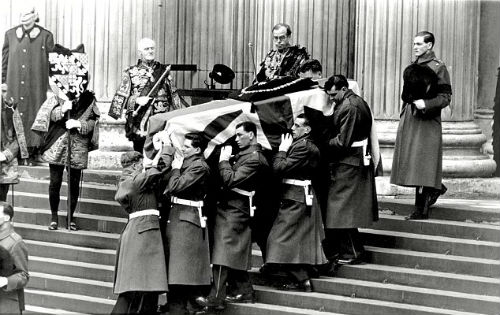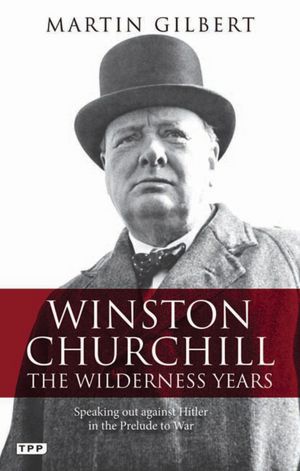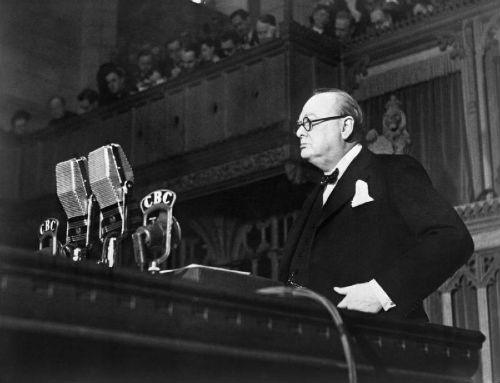When Leaders Led: Thoughts About Winston Churchill
By Neil Earle
 Sir Winston Churchill's coffin leaves St Paul's cathedral following his funeral service in 1965.
Sir Winston Churchill's coffin leaves St Paul's cathedral following his funeral service in 1965.The recent Presidential election in the United States revealed the dire importance of choosing leaders to point the road ahead in our democratic life. So much money, talent and treasure is expended in the search for that elusive quality called leadership especially in war-time conditions that it might be time to reflect again on the supreme example in the 20th century of leadership under pressure.
Winston Churchill (died January 24, 1965) was best known to history as Prime Minister of Great Britain through the darkest days of World War Two (1940-1945).
Sir Winston first came into my life during a stormy February morning in 1952 on the east coast of Canada. My aunt Helen and I were getting ready for school at St. Andrew’s up the road (she was my teacher). A grumpy voice came on the radio after a cannon shot exploded and “God Save the King” resounded. ”Shhh that’s Churchill” Helen said as we stepped closer to the radio. Then serving his second term as Prime Minister (1951-1955), Churchill was announcing the death of King George VI (of “The King’s Speech”) to the Empire/Commonwealth.
Nine years later came the unveilings to my tender teenage eyes of the Churchill legend. That winter my father and I sat in front of our black and white Emerson TV set in the cold inner room of our house. We were gobbling up a magnificent 26-volume series produced by ABC-TV titled “The Valiant Years.” Introduced by the stirring trumpets and cymbals setting off notes composed by Richard Rogers of “Sound of Music Fame” the camera moved into a close-up of Churchill’s face. It then closed in on those limpid all-seeing eyes that struck my 14-year-old sensibility as the archetype of the Wise Old Man.
From that moment I had found a political and literary hero. The voice of Richard Burton reading Churchill’s words, the breakneck narration, and the exalted musical swells stayed with me. Now that I have been a church pastor for almost 43 years I can report how I still draw inspiration from Churchill’s dominant moment on the international stage. That was 1940-1941 when what he called “Christian civilization” seemed imperiled by the dark nightmare of the Third Reich (1933-1945).
Churchill’s leadership was critical to preventing the British Commonwealth from going under and world slipping back into another Dark Age. Yet my old boyhood hero was far from perfect. As he liked to joke: “I have asked if I am ready to meet my Maker but it is more, Is my Maker ready to meet me?”
Ups and Downs
Over the years since 1965 Churchill’s career has been more than a little scrutinized. On his death fifty years ago there was little doubt of his standing and stature. As late as 2002 the BBC voted him the greatest Briton. His stirring and defiant oratory flung in the face of Adolph Hitler in 1940 “mobilized the English language and sent it into battle” in President John F. Kennedy’s fine phrase.
But after 1940 there were many defeats and retreats for the British forces. In the 1970s appeared Robert Rhodes James’ Churchill: A Study in Failure detailing Churchill’s many off key policies before his finest hour in 1940, including supporting King Edward VIII in the crisis that saw a British monarch abdicate – a shocker to the world and Empire that resounded down to the 1980s.
So my teen years loyalty flagged off and on over the years in the face of analyses claiming Churchill sold out to the Americans, that his strategic interventions were flawed and costly (much too true), that he caused the Allies much extra stress with his anxieties over the Normandy landings in 1944 (for which he later apologized). Nevertheless, while waiting with my wife at Memphis International Airport on June 5, 2011 my eyes were quite steadily drawn back to a book in the nearby store. It was written by the nimble-minded British author Max Hastings and titled Winston’s War: Churchill 1940-1945.
The last sentence in the foreword pushed me back into the Churchill file: “The Second World War…here was something which our parents and grandparents did well in a noble cause that will forever be identified with the person of Winston Churchill warlord extraordinary.”
On this near-anniversary date I have culled out four lesser-known incidents from the man’s extraordinary career, fairly obscure events that may well serve interesting in our less heroic-minded times. One of them involves very near where I grew up.
1. Creator of Modern Iraq, 1921. This is a legacy a political figure may want to shun in today’s world but at the time it seemed like not such a bad idea. When the French and British found themselves astride the corpse of the Ottoman Empire after World War One in 1920, Churchill was serving as Colonial Secretary with orders to solve the Middle Eastern problem quickly and as inexpensively as possible. Earlier, while Secretary of War and Air, he had not hesitated to contemplate the use of gas against Iraqi rebels though he also deplored the trigger-happy antics of certain RAF pilots (Niall Ferguson, The War of the World, page 412).
With the help of T.E. Lawrence (“Lawrence of Arabia”) Churchill was able to install King Faysal in Baghdad in the new country of Iraq, an arrangement that lasted until 1933. “It was a matter of marking lines on a map” as Brian Lapping summarized in The End of Empire but maybe the best deal of a bad choice according even to critic Robert Rhodes James. Today most historians deplore the mess in Mesopotamia as a result of overt imperialism but who would not accept 12 years of stability there today?
And Churchill’s predilection for using poison gas if necessary surfaced again when England was threatened with invasion in 1940 (Gwynne Dyer, War, page 181). A chip off the legend, no doubt.

2. Churchill’s near bankruptcy. This point is reported by official biographer Martin Gilbert. Churchill had lost money in the Great Depression and had never held high office in the 1930s. Thus, in April, 1938 he felt compelled to put Chartwell, his “expensive mausoleum of a home” (in his wife’s words) on the market. Either that or he would have to withdraw from parliament and write even more feverishly to keep up things. A close associate explained the predicament to an admirer of Churchill’s, an industrialist who agreed to pay the debt on condition Churchill would incur no further liability (Winston Churchill: The Wilderness Years, page 222).
Churchill fans speculate: What if the great man had to leave parliament with war on the way? It was just as well he did not.
3. Courting the Americans. This brings my home area of Newfoundland into the picture. U.S. President Franklin D. D Roosevelt (FDR) and Churchill’s meeting at Argentia, Newfoundland in August of 1941 is the starting event for the astute Nigel Hamilton’s recent study of FDR titled The Mantle of Command. Battered by the Nazi air force and harassed by the U-Boat campaign, Churchill’s island desperately hoped the United States would enter the war on England’s side. The Newfoundland rendezvous was thus catalytic. Out of it came the Atlantic Charter, a visionary statement of ideals springing from the history of both countries. Hamilton praises FDR for setting out war aims which both nations could adhere to even before American participation in the war.
Less reported or seen as significant was Churchill’s plan to stress Anglo-American solidarity by arranging a worship service that Sunday, August 10 on the deck of HMS “Prince of Wales.” Churchill confessed later that he picked the hymns himself. Many have seen the film clips and they are still stirring after all these years, FDR and Churchill sitting side by side singing hymns both nation’s knew so well. “Churchill had personally choreographed a worship service for his guest, down to the details of seating, the hymns to be sung, and the order in which they would be given voice (William Manchester and Paul Reid, The Last Lion: Defender of the Realm, 1940-1965, page 394).
The Prime Minister as hymn master has been rarely reported but Churchill was seen to daub tears from his eyes as he and Roosevelt joined the ship’s crew in singing “O God Our Help in Ages Past” and “Onward Christian Soldiers.” FDR reported this was the emotional high point of the service (see video clip).
As the two leaders prepared to depart Roosevelt grabbed the Britons hand and said “Yes we are Christian solider when all is said and done.” This was progress. Churchill wrote later in his memoirs, “It was a great hour to be alive. Nearly half of those who sang were soon to die.” The sinking of the “Prince of Wales” and the attack on the American base at Pearl Harbour were both only four months distant (Churchill, The Grand Alliance, page 342).
 Churchill's 'Chicken speech' to the Canadian Parliament in December 1941.
Churchill's 'Chicken speech' to the Canadian Parliament in December 1941.4. A Secret Heart Attack. Winston Churchill spent the Christmas of 1941 at the White House. The Japanese attack on the Hawaiian Islands had thrown the U.S. and British Commonwealth together at last. Churchill made a great hit speaking to a joint session of Congress, the first non-American so honored. Later he was awakened by oppressive heat in his bedroom at the Presidential mansion. He rose to open a window. It stuck. Churchill pushed and grunted and then felt an acute pain in his left arm and chest. He had suffered a mild stroke. His doctor would not tell him more than only to watch his pulse (Manchester and Reid, page 458).
Soon after, Churchill boarded the train for the Canadian capital in Ottawa. Here he was, barely recovered from a heart attack and yet standing up to give one of his most memorable speeches, one that featured the grim humor of the kind people needed. He reflected on the French eagerness to surrender in 1940.
“When I warned them that Britain would fight on alone whatever they did, their generals told their Prime Minister, and his divided cabinet: In three weeks England will have her neck wrung like chicken!’
“Some chicken!” (Loud applause)
“Some neck!” (Uproarious applause and desk-thumping). In ill health, he had warmed the cockles of the nation's heart in a dark winter when the news was almost all bad. Only the Churchill magic could abate the mood.
Honor to Whom Honor
Yes, Winston Churchill was quite a man. I could have picked a worse hero for it says in Romans 13:7 which says “Pay to all what is owed to them…honor to whom honor is owed.” Few public servants (called “ministers of God” in the King James text of Romans 13:4) have been more honored than my old hero Winston Churchill. The great Christian writer C.S. Lewis always taught how good it was for youths to find worthy heroes to emulate, how it brings them out of themselves and sets them on a course towards more noble aspirations than following the trivial and dangerous detours youth is heir to.
Churchill's faults and giant-sized flaws, as this brief accounting implies, has not erased his mark on his time. At his funeral 115 heads of state marched in sympathy, the greatest outpouring up to then. One quote captures his determined and visionary optimism that played such a part in Anglo-American survival in 1940: “Although we are very much aware of the short-comings of our civilization, and the need of continual social betterment, we believe fervently that our institutions are such as to enable us to improve conditions and correct abuses steadily, and to march every year and every decade forward upon a broader front into a better age.”
“A better age.” A good credo still. Richard Rogers was right: a spiritual foundation undergirded the Allied cause in World War Two that surfaced more than once. Thank God for that and for leaders who could lead.